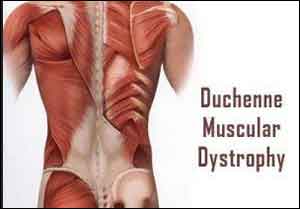- Home
- Editorial
- News
- Practice Guidelines
- Anesthesiology Guidelines
- Cancer Guidelines
- Cardiac Sciences Guidelines
- Critical Care Guidelines
- Dentistry Guidelines
- Dermatology Guidelines
- Diabetes and Endo Guidelines
- Diagnostics Guidelines
- ENT Guidelines
- Featured Practice Guidelines
- Gastroenterology Guidelines
- Geriatrics Guidelines
- Medicine Guidelines
- Nephrology Guidelines
- Neurosciences Guidelines
- Obs and Gynae Guidelines
- Ophthalmology Guidelines
- Orthopaedics Guidelines
- Paediatrics Guidelines
- Psychiatry Guidelines
- Pulmonology Guidelines
- Radiology Guidelines
- Surgery Guidelines
- Urology Guidelines
Risk Factors for Duchenne Muscular Dystrophy Identified

A new study from UT Southwestern suggests that more people with Duchenne muscular dystrophy could live longer by identifying and more aggressively treating patients with certain risk factors.
The study, appearing in the Journal of the American Heart Association, is the first to identify predictors of poor outcomes in Duchenne muscular dystrophy (DMD) patients, said senior author Dr. Pradeep Mammen, a heart failure specialist at UT Southwestern Medical Center.
Researchers found three traits common among those who died earlier:
- Underweight (average 17.3 BMI, or body mass index, versus 25.8 average BMI in those who survived the study);
- Poorer lung function, measured in terms of the highest pressure during inhalation;
- Higher levels of proteins in the blood that indicate the heart is damaged or weakened.
There was also some evidence of lower levels of an enzyme found in patients with liver damage among those who died.
“If we can intervene sooner, before it’s too late, we may be able to extend their lives,” said Dr. Mammen, Associate Professor of Internal Medicine and Medical Director of UT Southwestern’s Neuromuscular Cardiomyopathy Clinic.
For example, an earlier study found that only half of adult DMD patients with evidence of cardiomyopathy were on heart failure medications, the researchers noted.
Adding other heart medications, such as beta blockers and mineralocorticoid antagonists, to the more commonly used ACE inhibitors could help prevent decline in heart function and postpone death, the researchers concluded. Implanting defibrillators to treat irregular heartbeat also was suggested.
Finally, the study endorsed cardiac MRI over the commonly used echocardiography as a more sensitive test to evaluate the severity of heart problems in DMD patients.
The UT Southwestern study followed 43 patients for about two years. Duchenne muscular dystrophy is an inherited, incurable disease that destroys muscles and eventually proves fatal as respiratory and heart muscles are affected. It strikes 1 in 5,000 male infants in the U.S and is the most common and severest form of muscular dystrophy among boys. Symptoms usually appear between ages 3 and 5.
But improved care in the last 20 to 30 years has dramatically lengthened patient lives.
“I think the general thought process is: ‘These patients are not going to live long,’” said Dr. Mammen, Director of Translational Research for UT Southwestern’s Advanced Heart Failure Program. “Well, that’s false.”
Fifteen years ago, almost none of these patients lived into their 20s. Now, roughly 70 percent live into adulthood, and it’s not uncommon to see patients survive into their 30s and 40s, he said. More DMD patients could live longer with more aggressive medical therapy and other treatments, said Dr. Mammen, whose research investigates the molecular mechanisms underlying heart failure.
Promising genetic research led by Dr. Eric Olson, Chairman of Molecular Biology, is underway at UT Southwestern that could one day eliminate the genetic mutation that causes the disease, he added.
Using two new gene-editing techniques, scientists from the Senator Paul D. Wellstone Muscular Dystrophy Cooperative Research Center at UT Southwestern stopped progression of Duchenne muscular dystrophy in mice.
Using the new gene-editing enzyme CRISPR-Cpf1, researchers from the Olson Laboratory successfully corrected Duchenne muscular dystrophy in human cells and mice in the lab. The UT Southwestern group had previously used CRISPR-Cas9, the original gene-editing system, to correct the dystrophin defect in a mouse model of the disease and in human cells.
Researchers at the Center, co-directed by Drs. Olson and Mammen, have successfully edited mutations in the X-linked DMD gene that encodes the protein dystrophin in human cells. They are now working toward human trials for the gene-editing approach. If efficiently and safely scaled up in DMD patients, this technique could lead to one of the first successful genome editing-based treatments for this fatal disease.

Disclaimer: This site is primarily intended for healthcare professionals. Any content/information on this website does not replace the advice of medical and/or health professionals and should not be construed as medical/diagnostic advice/endorsement or prescription. Use of this site is subject to our terms of use, privacy policy, advertisement policy. © 2020 Minerva Medical Treatment Pvt Ltd